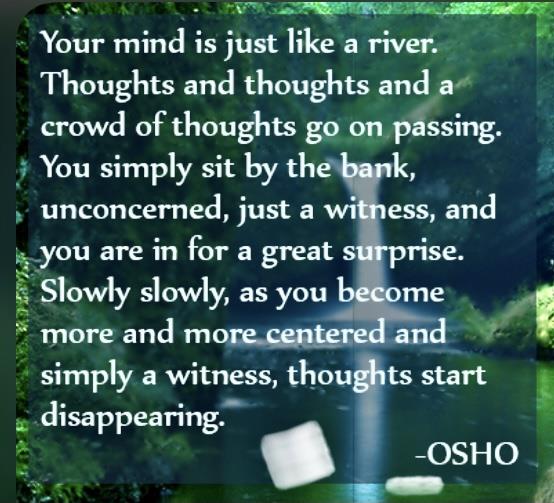People often wonder how they can stop themselves from experiencing negative emotions like anxiety, nervousness, or anger, but the Truth is, you don’t focus on controlling it. Why? Because you can’t control your Thinking Mind. Your Thinking Mind will continue to produce thoughts. Your emotions will continue to pop up. For instance, if I told you right now to NOT think about a pink elephant, you probably still will. What happened here was that your Observing Mind was watching your Thinking Mind picture pink elephants, even though you were telling your Thinking Mind not to. The Thinking Mind is always producing thoughts and if we aren’t accustomed to using our Observing Mind, then we get ourselves lost in our Thinking Mind. This is the same for emotions, such as anxiety and stress, and it is where a lot of suffering comes from. We can’t help but get sucked into the negative emotions, rather than taking a step back and observing them. A lot of our psychological stress comes about because we don’t recognize the difference between the Thinking Mind and Observing Mind. But the trick is not to identify with those emotions when they occur. This is why Zen philosophy advises saying “I feel anger” rather than “I am angry”. You can’t control your emotions, but you can control your behavior. Negative emotions occur spontaneously. We all produce them, and unfortunately, that’s not going to change. No matter how many positive thoughts you try to think, or therapies you engage yourself in, negative thoughts and emotions will pop up. It’s just part of being human. But you can learn to accept them, avoid identifying with them, and then act despite them. The problem with trying to get rid of anxiety is that the more you try, the stronger the emotion will become. Negative emotions are a bit like quicksand. The harder you try to get out, then further into the sand you sink. Instead, a better approach is to accept your negative emotions, avoid attaching to them, and then move on.
Osho compares the mind the same as if you are sitting on the bank, watching the thoughts flowing by. Don’t do anything, don’t interfere, don’t stop them in any way. Don’t repress in any way. If there is a thought coming don’t stop it, if it is not coming don’t try to force it to come. You are simply to be an observer….” Once you learn to treat your mind like a river you flowing by, Osho says that you’ll begin to understand that you and your thoughts are truly separate: ”In that simple observation, you will see and experience that your thoughts and you are separate – because you can see that the one who is watching the thoughts is separate from the thoughts, different from them. And you become aware of this, a strange peace will envelop you because you will not have any more worries. And if you become aware that you are not your thoughts, the life of these thoughts will begin to grow weaker, they will begin to become more and more lifeless. The power of your thoughts lies in the fact that you think they are yours. When you are arguing with someone you say, “My thought is”. No thought is yours. All thoughts are different from you, separate from you. You just be a witness to them.
Becoming the observer simply means taking a step back from your mind and becoming aware of your thinking patterns and how you’re responding to things. But it’s a powerful concept, and it’s crucial to understand if one is to successfully practice meditation and find true inner peace. It may sound a little strange, particularly if you believe that you are your mind, so how is it possible to observe it? We need to make a distinction between the mind and you; hence, it’s important to realize that thinking is only a small aspect of consciousness. Thought cannot exist without consciousness, but consciousness does not need thought. It is the same concept of meditation; “There is no other miracle in the world than meditation. It is the only science transforming you into a new man.” - Osho. ❤️
